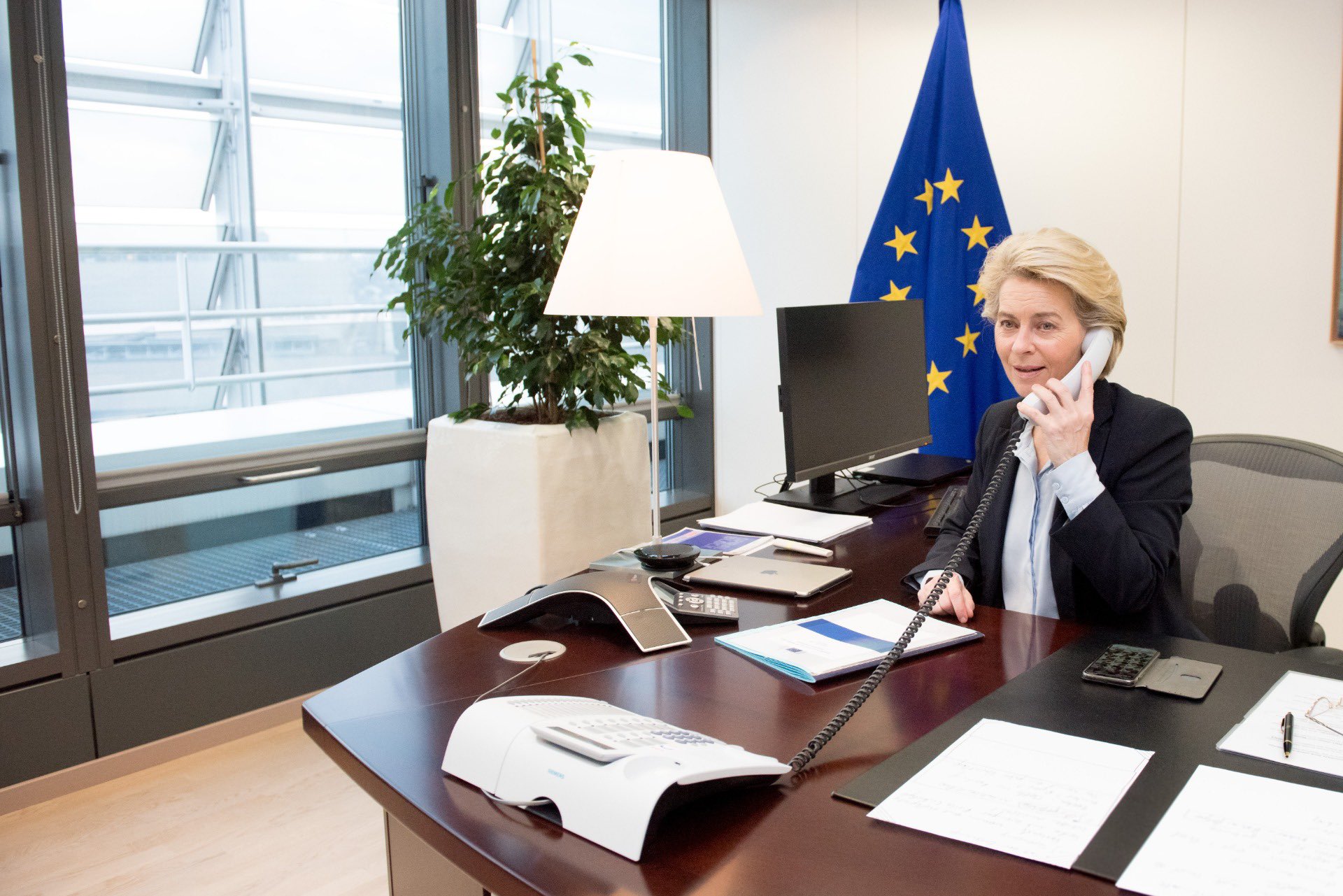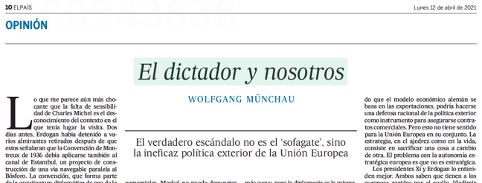Here are the real EU diplomatic failures (other than sofa-gate). Word of Munchau

The real scandal is not the “sofa-gate”, but the ineffective foreign policy of the European Union. All the faults according to the Munchau analysis published in El Pais on 12 April
 What strikes me even more than Charles Michel's insensitivity is his ignorance of the context in which the visit took place. Two days earlier, Erdogan had arrested several retired admirals after stressing that the 1936 Montreux Convention should also apply to the Istanbul Canal, a project to build an inland waterway parallel to the Bosphorus.
What strikes me even more than Charles Michel's insensitivity is his ignorance of the context in which the visit took place. Two days earlier, Erdogan had arrested several retired admirals after stressing that the 1936 Montreux Convention should also apply to the Istanbul Canal, a project to build an inland waterway parallel to the Bosphorus.
The convention, which is part of the diplomatic peace architecture of 20th century Europe, gave Turkey the right to restrict the passage of foreign military ships in wartime, but guarantees the free transit of civilian and military ships in time of peace, within certain limits.
An agreement was made to end the series of Russo-Turkish wars for control of the Black Sea. Now that Russia is deploying its troops on the Ukrainian border, Turkey's seizure of power in the region would surely be the l last of the wishes of the European Union.
How does the EU plan to take a photo with Turkey's dictator at a time like this? With a man who commits serial human rights violations in his country and who is now openly breaking the norms of international law?
As in war, weapons are also chosen in diplomacy. There is a time for photos and another for diplomacy made up of discreet behind-the-scenes meetings.
The real scandal that occurred last week has nothing to do with the sofas, but with the diplomatic failure of the EU.
As its leaders clash with foreign dictators, the Union has let its member states become dependent on Russian gas, Chinese telecommunications technology, and Turkey as a buffer against migration flows.
A more precise symbol of the state of European diplomacy was Xi Jinping's telephone conversation with Angela Merkel. The Chinese president told the chancellor that the Union should seek its strategic autonomy to detach itself from the United States and strengthen ties with China. It is significant that the Chinese president thinks he can define what is meant by strategic autonomy of the European Union.
Right now, the search for strategic autonomy boils down to business relationships. Merkel cannot denounce human rights violations against Uighurs because Volkswagen cannot rule out that part of its Chinese supply chain uses labor exploitation.
But the current German Chancellor is not as insensitive as his predecessor, Gerhard Schröder, who bluntly stated that foreign policy is a matter of interests, not human rights. His language is softer, but diplomacy is the same.
Looking at the thought of German foreign policy it seems to be the United States in 1953, when Charles Wilson, the president of General Motors, about to become Secretary of Defense, expressed himself in these terms, now gone down in history, during the hearing of confirms: "What's good for General Motors is good for the United States".
Since the German economic model is based on exports, a rational defense of foreign policy could be a tool for securing trade contracts. However, this makes sense for Germany as a single state, but not for the European Union considered in its sense of an overall union of the interests of each single member state.
Strategy, in chess as in life, is to sacrifice one thing for another. The problem with European strategic autonomy is that it is not strategic.
Presidents Xi and Erdogan understood the hint much better. They both know they have Europeans by the neck. Vladimir Putin managed to forge strong trade links with Europe through gas deals.
The obsession with Sputnik V in Europe may be just another way for Europeans to become addicted to Russia.
We Europeans were able to avoid the consequences of our non-strategic policy only because we were deeply immersed in a transatlantic relationship in which the United States was responsible for all strategic thinking.
In return, the old continent has promised fidelity. It is clear that this is not a sustainable model in the 21st century. But, for the moment, in Brussels and in the national capitals there is not the slightest awareness that the value of strategic autonomy depends on the chosen strategy.
I have come to the conclusion that the European Union should not engage in foreign and security policy at the highest level until all this changes.
However, the arguments for a European foreign and security policy remain strong – just as the vaccine is for a European disease control center – but they must be based on clear objectives. Unless this is the case and until it is, EU diplomacy will remain awkward.
This is a machine translation from Italian language of a post published on Start Magazine at the URL https://www.startmag.it/mondo/ecco-i-veri-fallimenti-diplomatici-ue-altro-che-sofa-gate-parola-di-munchau/ on Wed, 14 Apr 2021 12:00:55 +0000.
